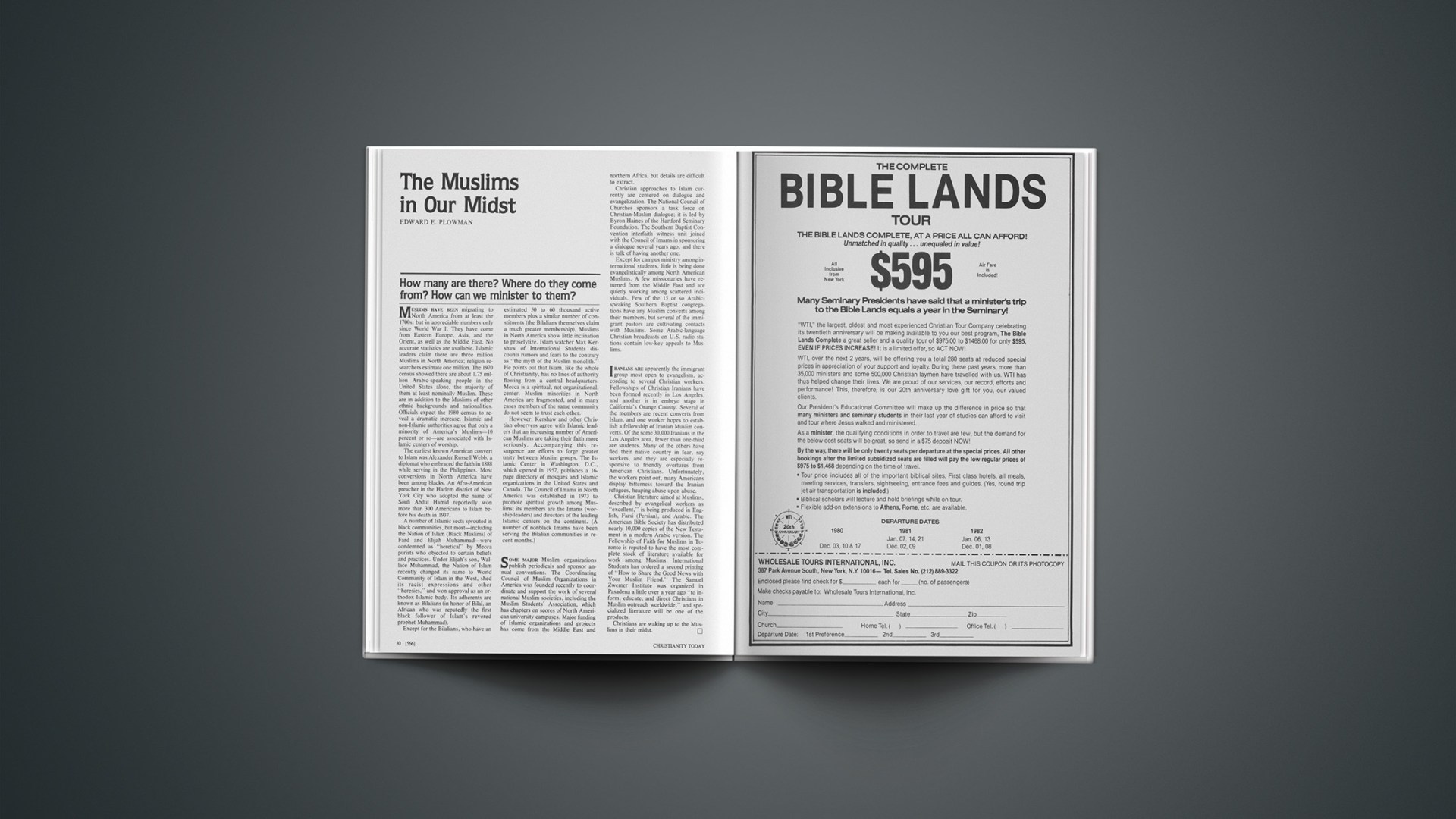How many are there? Where do they come from? How can we minister to them?
Muslims have been migrating to North America from at least the 1700s, but in appreciable numbers only since World War I. They have come from Eastern Europe, Asia, and the Orient, as well as the Middle East. No accurate statistics are available. Islamic leaders claim there are three million Muslims in North America; religion researchers estimate one million. The 1970 census showed there are about 1.75 million Arabic-speaking people in the United States alone, the majority of them at least nominally Muslim. These are in addition to the Muslims of other ethnic backgrounds and nationalities. Officials expect the 1980 census to reveal a dramatic increase. Islamic and non-Islamic authorities agree that only a minority of America’s Muslims—10 percent or so—are associated with Islamic centers of worship.
The earliest known American convert to Islam was Alexander Russell Webb, a diplomat who embraced the faith in 1888 while serving in the Philippines. Most conversions in North America have been among blacks. An Afro-American preacher in the Harlem district of New York City who adopted the name of Soufi Abdul Hamid reportedly won more than 300 Americans to Islam before his death in 1937.
A number of Islamic sects sprouted in black communities, but most—including the Nation of Islam (Black Muslims) of Fard and Elijah Muhammad—were condemned as “heretical” by Mecca purists who objected to certain beliefs and practices. Under Elijah’s son, Wallace Muhammad, the Nation of Islam recently changed its name to World Community of Islam in the West, shed its racist expressions and other “heresies,” and won approval as an orthodox Islamic body. Its adherents are known as Bilalians (in honor of Bilal, an African who was reputedly the first black follower of Islam’s revered prophet Muhammad).
Except for the Bilalians, who have an estimated 50 to 60 thousand active members plus a similar number of constituents (the Bilalians themselves claim a much greater membership), Muslims in North America show little inclination to proselytize. Islam watcher Max Kershaw of International Students discounts rumors and fears to the contrary as “the myth of the Muslim monolith.” He points out that Islam, like the whole of Christianity, has no lines of authority flowing from a central headquarters. Mecca is a spiritual, not organizational, center. Muslim minorities in North America are fragmented, and in many cases members of the same community do not seem to trust each other.
However, Kershaw and other Christian observers agree with Islamic leaders that an increasing number of American Muslims are taking their faith more seriously. Accompanying this resurgence are efforts to forge greater unity between Muslim groups. The Islamic Center in Washington, D.C., which opened in 1957, publishes a 16-page directory of mosques and Islamic organizations in the United States and Canada. The Council of Imams in North America was established in 1973 to promote spiritual growth among Muslims; its members are the Imams (worship leaders) and directors of the leading Islamic centers on the continent. (A number of nonblack Imams have been serving the Bilalian communities in recent months.)
Some major Muslim organizations publish periodicals and sponsor annual conventions. The Coordinating Council of Muslim Organizations in America was founded recently to coordinate and support the work of several national Muslim societies, including the Muslim Students’ Association, which has chapters on scores of North American university campuses. Major funding of Islamic organizations and projects has come from the Middle East and northern Africa, but details are difficult to extract.
Christian approaches to Islam currently are centered on dialogue and evangelization. The National Council of Churches sponsors a task force on Christian-Muslim dialogue; it is led by Byron Haines of the Hartford Seminary Foundation. The Southern Baptist Convention interfaith witness unit joined with the Council of Imams in sponsoring a dialogue several years ago, and there is talk of having another one.
Except for campus ministry among international students, little is being done evangelistically among North American Muslims. A few missionaries have returned from the Middle East and are quietly working among scattered individuals. Few of the 15 or so Arabic-speaking Southern Baptist congregations have any Muslim converts among their members, but several of the immigrant pastors are cultivating contacts with Muslims. Some Arabic-language Christian broadcasts on U.S. radio stations contain low-key appeals to Muslims.
Iranians are apparently the immigrant group most open to evangelism, according to several Christian workers. Fellowships of Christian Iranians have been formed recently in Los Angeles, and another is in embryo stage in California’s Orange County. Several of the members are recent converts from Islam, and one worker hopes to establish a fellowship of Iranian Muslim converts. Of the some 30,000 Iranians in the Los Angeles area, fewer than one-third are students. Many of the others have fled their native country in fear, say workers, and they are especially responsive to friendly overtures from American Christians. Unfortunately, the workers point out, many Americans display bitterness toward the Iranian refugees, heaping abuse upon abuse.
Christian literature aimed at Muslims, described by evangelical workers as “excellent,” is being produced in English, Farsi (Persian), and Arabic. The American Bible Society has distributed nearly 10,000 copies of the New Testament in a modern Arabic version. The Fellowship of Faith for Muslims in Toronto is reputed to have the most complete stock of literature available for work among Muslims. International Students has ordered a second printing of “How to Share the Good News with Your Muslim Friend.” The Samuel Zwemer Institute was organized in Pasadena a little over a year ago “to inform, educate, and direct Christians in Muslim outreach worldwide.” and specialized literature will be one of the products.
Christians are waking up to the Muslims in their midst.
Carl F. H. Henry, first editor of Christianity Today, is lecturer at large for World Vision International. An author of many books, he lives in Arlington, Virginia.










